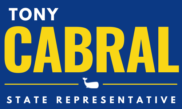REP. CABRAL ANNOUNCES HOUSE ARPA SPENDING PACKAGE
November 3, 2021
HOUSE OF REPRESENTATIVES PASSED HISTORIC $3.82 BILLION BILL FOR COVID-19 NEEDS AND RECOVERY
New Bedford and other communities directly impacted by COVID-19 to benefit from recovery funds
BOSTON, MA – On Friday, Representative Antonio F. D. Cabral (D-New Bedford) joined his House colleagues in unanimously passing a $3.82 billion spending proposal utilizing American Rescue Plan Act (ARPA) funds and Fiscal Year 2021 (FY21) Budget Surplus funds. House Bill H.4219 An Act relative to immediate COVID-19 recovery needs addresses disparities exacerbated by the COVID-19 pandemic, aiming to facilitate recovery through one-time investments in housing, infrastructure, environment and climate mitigation, economic development, workforce, health and human services, and education. This historic spending package’s specific, targeted investments will make our Commonwealth stronger, more equitable, and more inclusive.
New Bedford
Not only will New Bedford benefit from this spending package as a Gateway City, particularly one disproportionately affected by COVID-19, but Bill H.4219 includes several amendments that are a direct result of Rep. Antonio Cabral’s advocacy for these local programs:
- Amendment #684 New Bedford Art Museum $150,000
- Amendment #707 New Bedford Cape Verdean Association $200,000
- Amendment #741 New Bedford Festival Theater $50,000
- Amendment #757 Zeiterion Performing Arts Center $200,000
- Amendment #767 Frederick Douglass House $50,000
- Amendment #822 AHA! Art, History & Architecture of New Bedford $50,000
Another amendment, co-sponsored by Rep. Cabral, will also make lasting impacts in New Bedford. Amendment #1093 Equitable recovery for BIPOC small businesses and communities of color increased funding by $10 million (thereby increasing the total to $35 million) for businesses that focus on reaching underserved markets and minority-owned, women-owned and veteran-owned businesses.
New Bedford’s infrastructure will also greatly benefit, as the bill invests millions into various infrastructure projects and improvements including:
- $100 million for port infrastructure development and revitalization to facilitate economic activity and support the offshore wind industry
- $100 million to water and sewer infrastructure programs, with the goal of reducing costly financial burdens on municipalities for much needed upgrades that protect our environment and public health
- $25 million in urban tree investments based on the successful Greening the Gateway Cities program, increasing climate benefits, lowering energy costs, and addressing heat islands in urban areas
- $100 million in funding for the municipal vulnerability preparedness program, which targets local climate response and resiliency
- $78 million in food security infrastructure grants
This $3.82 million spending package also includes investments into housing, workforce development, economic development, and boosting our healthcare system. The bill allocates $600 million into housing across various programs, including major investments in home ownership assistance grants, public housing improvements, supportive housing funds, and housing and rental housing production. $445 million will be invested in workforce development, including workforce skills training, vocational and career technical school needs, Health and Human Service Worker targeted support, community colleges, and youth jobs. These investments will help ensure that our workforce has the skills, tools and training needed to succeed in the commonwealth’s post-pandemic economy. Notably, the bill features a new Premium Pay program that will invest $500 million towards providing premium pay bonuses for low- and middle-income workers who worked in-person during the COVID-19 State of Emergency. Healthcare system programs will receive $800 million of investments, including $150 million in grants to local and regional public health boards, $250 million for our community hospitals, $250 million towards behavioral health programs, $70 million for our nursing homes with an emphasis on the workforce needs, $20 million to improve technical infrastructure for our community health centers, as well as funds for community-based gun violence programs and reentry programs. In the area of economic development, this bill invests nearly $800 million into a broad array of economic development items that will help small businesses receive targeted assistance, including a $500 million deposit into the Unemployment Trust Fund to offset businesses’ contributions for unemployment programs. The bill also includes $125 million investment into cultural and tourism assets to assist recovering cultural organizations and artists. Finally, the House’s bill allocates $5 million for the Inspector General’s office to create a public database and website to track total spending, including the percentage of funds spent in communities that were disproportionally impacted by the COVID-19 pandemic and to track the number of projects awarded to minority-owned businesses and organizations.
The house’s $3.82 billion spending package invests in nearly every major sector of our economy, and its focus on communities disproportionately affected by the COVID-19 pandemic reflects the legislature’s commitment to equitably rebuilding those communities and helping those residents who were hit hardest over the last year and a half. These strategic investments will make lasting, impactful changes to communities like New Bedford for years to come as we rebuild and recover from COVID-19.
“The COVID-19 pandemic exposed and exacerbated many issues that we have known were building for some time,” said Rep. Cabral. “This ARPA funding represents a unique and unprecedented opportunity to target investment toward the programs that can build the physical and societal infrastructure we need to have an equitable and sustainable recovery – while helping the workers, families and small businesses in communities, like New Bedford, who have been most greatly impacted by this upheaval,” added Rep. Cabral.
As the next step in the process, the bill now moves to the Senate for their consideration.
###
